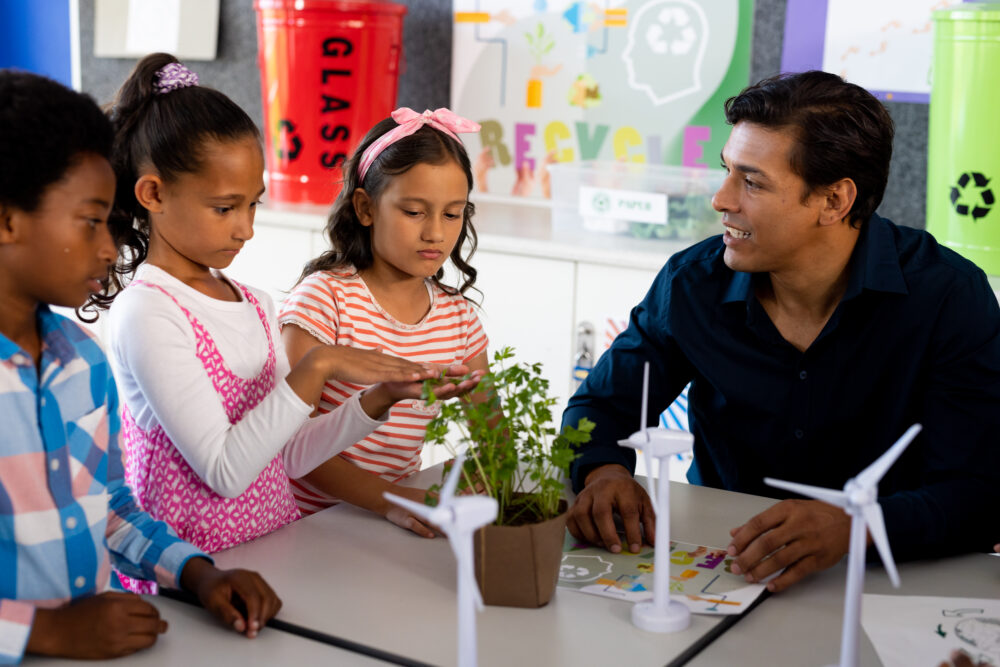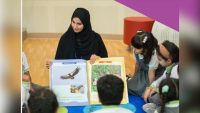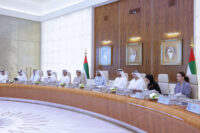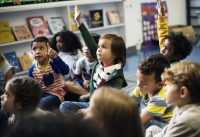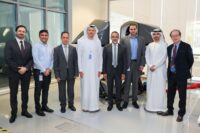Schools are integrating sustainability into their curriculum, fostering hands-on experiences and engaging in global initiatives such as COP28
Dubai, Dec 11, 2023: COP28 saw the introduction of the Greening Education Hub by the UAE Ministry of Education, emphasising education’s crucial role in addressing climate change.
Education has an important role to play in moving towards a more sustainable future. It not only equips students with knowledge but also gives them values and skills to understand the environmental challenges and tackle them with sustainable practices.
COP28 has definitely given an impetus to schools in the region to raise sustainability as a global issue but GCC schools have already been on the path, making it not only an ethical imperative but also a crucial aspect of education and their daily routines. The schools are fostering sustainability among students through various strategies.
They have integrated sustainability into subjects through units, lessons plans and events, and have introduced in-house projects such as e-waste collection, smart recycling systems, greenhouse and solar panels. Schools are focusing on involving parents and the broader community in sustainability initiatives.
They are collaborating with universities and companies to give students real-world exposure. Schools have been inviting sustainability experts and celebrating community members embracing eco-friendly practices, reinforcing the importance of sustainability.
Educators admit that experiential learning is essential for young learners. Activities such as field trips and cleanup campaigns can greatly enhance their comprehension of these topics, they say.
The key is to encourage student-led initiatives, empowering students to take ownership of their environmental impact, they add.

Laurence Myers, Service-Learning Coordinator, American School of Dubai
To inspire sustainable action within a school community, a multifaceted approach can be employed. Firstly, create a team of ‘sustainability champions’ to provide thought leadership, share research and partnership in the school’s direction. Engage the community in conversations and co-creation of a vision, definition and/or framework for sustainability while establishing bold expectations regarding sustainability in learning and operations.
Cultivate a connection to nature, either on campus or, ideally, in natural settings where students can generate a deeper appreciation for the value of nature and the benefits of being good stewards for the planet. Moreover, ensure that the documented curriculum is connected to sustainability and provides relevance (with particular focus on ‘core’ courses that engage all students). Build capacity for educators in the form of open conversations, workshops, online learning, mentoring, co-planning, etc. Ensure sufficient resources to support hands-on engagement and learning for everyone and create opportunities for students and community to engage in on-going, authentic conversations related to sustainability.
Build community-wide partnerships related to sustainable best-practices. Celebrate the work already being done and give voice to the successes.

Simon Crane, Head Master, Brighton College Dubai
Incorporating sustainability into the curriculum is paramount. Schools should integrate sustainability topics across various subjects, showcasing real-world examples and consequences.
Experiential learning is also key. Organise field trips to eco-friendly sites, engage in community projects, or create eco-clubs that empower students to take ownership of sustainable initiatives. These hands-on experiences instill a sense of responsibility and demonstrate the impact of individual actions.
Lastly, fostering a culture of sustainability requires ongoing communication and awareness campaigns. Regularly update students on global environmental issues, celebrate sustainable achievements and involve parents and the broader community in sustainability initiatives.

Ian Thurston, Principal, Dubai International Academy – Al Barsha
Our teachers have been using COP28 as an opportunity to raise sustainability as a global issue through lessons, unit plans and specific events.
Students take action through units as part of the learning experience and assessment, and the PYP Exhibition in Grade 5 links to the UN SDGs and sustainability. Students have communicated with global organisations such as the WWF, reached out to individuals, such as Dame Jane Goodall, as part of their work on deforestation as well as initiated a ‘plant a seed’ campaign to promote sustainable food security.
Our senior students have worked with University of Birmingham’s BIFoR project to consider the science and social sciences in understanding the importance of forests to humans and planet. Our students had the opportunity to present the issues and solutions they had researched at COP28 as part of the University of Birmingham, Dubai’s stand in the Green Zone. As a school, we have implemented specific projects such as e-waste collection and smart recycling systems, as well as installing a greenhouse and solar panels which will be linked to both academic and extra-curricular learning.
Global events such as COP28 allow our teachers to bring learning to life, setting activities in real-life examples increasing motivation and interest in students. Our students have grasped the opportunities provided to take action on sustainability and make a lasting impact on our communities, locally, nationally and globally.

Hitesh Bhagat, Principal, Dubai International Academy – Emirates Hills
At DIA – Emirates Hills, we employ various strategies to inspire sustainability amongst our students. Firstly, we integrate sustainability into our curriculum by offering projects and units focusing on environmental issues and solutions to raise awareness and the importance of looking after our environment. Additionally, we have numerous student led co-curricular groups, such as the Eco Club and the Water for Life Club that engage students in hands-on activities such as gardening, recycling programmes and energy conservation initiatives. We have events calendared throughout the year to promote awareness and allow our students to learn from environmental experts.
We also encourage student-led initiatives, empowering students to take ownership of their environmental impact and advocating sustainable practices. One of our current drives is around e-waste and is led by one of our Year 11 students, who through his dedication to the cause, has seen the initiative grow beyond the school and into the local community.

Daniella Aschettino, Head of Secondary, GEMS Metropole School – Motor City
We actively promote simple things like introducing recycling programmes, and making links to the students’ everyday environments so they can see the impact that they are having by making these little changes. However, these small changes can lead to making a greater impact within our school and the wider community. A small change can have a lasting effect.
This was one of the focus areas our secondary Eco Leaders researched; looking at how small behavioural changes can make a large impact in our lives. They captured this in their presentation at the Bradford University Sustainability Competition where they discussed changing the mindset towards fast fashion, and this is something we have now put into practice by having pre-loved uniform sales, and the annual MTS Walks, a sustainable fashion show. This is where students upcycle old clothes to make something new, instead of the used clothes ending up in a landfill.
We have also made cross-curricular links within the students’ learning, making it more memorable. The students are able to practically apply their knowledge and skills to real life scenarios, thus showing them that sustainable living and choices have lasting impact.
We have launched the MTS Farm and Farm Shop, where students across the school are involved in planting the seeds, growing and maintaining plants, harvesting and then selling them. It has not only shown students where food is from, but it has also given some students a sense of pride in the change they are making.
Throughout the term, the dedicated Eco Team at MTS has centred its efforts on addressing climate change, with COP28 serving as the focal point of our endeavours. Our talented Eco Leaders, representing various stages of the school, undertook a comprehensive Eco Audit, utilising its findings to craft strategic action plans aimed at transforming MTS into a greener and more sustainable institution.

Sydney Atkins, Vice Principal, GEMS Modern Academy – Dubai
In today’s educational landscape, leaders have a duty to uphold ethical standards, embrace moral and civic responsibilities, and fulfil a social mandate by nurturing students into sustainability seneschals. It is essential for young people to recognise their collective duty to safeguarding the welfare of the planet for both the current and upcoming generations.
To inspire a spirit of sustainability in students, schools must integrate it into the curriculum, fostering engagement and comprehension through interdisciplinary connections. Meaningful hands-on experiences, such as recycling drives, composting, upscaling and sustainable gardening, deepen understanding and instill the value of eco-friendly living. The school leadership’s vision and commitment are vital; schools must implement policies such as banning plastic, balloons and disposable water bottles and reducing printouts to cultivate an eco-conscious culture. These shouldn’t be done to be tokenistic but to drive home a commitment to sustainability.
External exposure, facilitated by inviting sustainability experts and celebrating community members embracing eco-friendly practices, reinforces the importance of sustainability. Student-led initiatives should be acknowledged, contributing to a narrative highlighting sustainable actions by all and for all. Crucially, school staff, including leaders, must lead by example, demonstrating personal commitment through tangible actions. This approach sets a powerful precedent, encouraging students to adopt sustainability as an integral part of their lives.

Justine Sandoval-Stewart, Sustainability Cluster Lead and Head of Social Enterprise, GEMS Wellington Academy – Al Khail
Students are driven to take action when they are well-informed and when they care, so the first and most effective strategy to inspire sustainable practices in students is to educate them. Including regular curriculum content with a collaborative, hands-on approach communicates the need for us to work together to find solutions to global issues but also enforces the importance of actively making changes towards these shared goals. Another strategy is to empower students with leadership roles such as Eco Warriors that give them the opportunity to shape and formulate their own approaches to sustainability both within the school and local communities.
As a school you need to create a shift in the culture that encourages students to be proactive about making changes, and a strategy that has proven to effectively support this is networking with sustainable companies that can offer bespoke learning experiences in the form of workshops and off-site visits for the students to make the real-life connections extending and consolidating their learning. Students need to feel encouraged and empowered to propose sustainable changes in schools, they need opportunities to be heard, and they must absolutely be involved in making those changes a reality.

Richard Drew, Principal, Jumeirah Baccalaureate School – Dubai
A critical step in sustainable development is embedding it into the curriculum, thus elevating students’ understanding of environmental issues. For example, in the IB curriculum, we prioritise creating interdisciplinary projects that merge social, economic and environmental sustainability.
For younger learners, experiential learning is essential. Activities such as field trips to eco-centric sites or organising school-based environmental initiatives such as cleanup campaigns can greatly enhance their comprehension of these topics. In secondary education, the introduction of guest speakers and interactive workshops can foster innovative and interactive discussions. At our school we enable students to take the lead on projects such as the Climate Freeze initiative, thereby educating their peers about sustainability.
Furthermore, schools can evaluate and refine their eco-friendly approaches, promoting student-driven projects and amplifying student voices for impactful change. Collaborations with local businesses that champion sustainability bolster these efforts. Additionally, integrating technology and innovation in teaching is crucial, as these areas significantly engage our students. Positioning sustainability within these modern contexts makes it more accessible and relevant. In subjects such as science and technology, we offer enriching learning experiences that empower students to discuss and develop solutions for environmental challenges.
By embracing these approaches, UAE schools can play a significant role in fostering a sustainability-centric mindset among students, thus steering towards a more environmentally conscious and responsible future.

Samina Khanyari, General Manager, Jumeirah International Nurseries – Dubai
At Jumeirah International Nurseries, our commitment to sustainability extends beyond mere practice, it’s woven into the fabric of our ethos. Here, eco-consciousness is not a subject taught; it’s a lifestyle modeled. By infusing our environment with sustainable, recycled and carbon-efficient resources, we show that being green is not just an option; it’s our standard.
We repurpose items that others might discard, giving them new life within our learning spaces. Old tyres transform into playful seating or a dinosaur biome, and repurposed wooden pallets become climbing structures or vertical gardens or mud kitchens. We show the children that imagination can turn anything into a resource, sparking a mindset that values reusability over disposability.
In our nursery, our staff artfully create learning corners with materials recovered from nature or recycled goods, proving that luxury isn’t about newness; it’s about creativity.
We’ve also changed the mindset of our staff, encouraging them to think outside of the proverbial recycling bin. For instance, during our events staff and children dive into recycled cardboards and materials collected from within the community, partnered with their boundless creativity, making artistic masterpieces and engineering wonders that form the sustainable background of all our state-of-the-art events.
Our JINS Energy Rangers programme sends our young eco-scouts on missions to ensure lights and devices are switched off when not needed, nurturing energy guardians. They learn that their actions, no matter how small, can make a big difference in reducing our carbon footprint.
At JINS we further prioritise efficiency and sustainability in all our Centres by incorporating sensor technology for lighting our corridors and common spaces, strategically aimed at minimising energy waste.
The lasting impacts of these efforts are profound. Children leave JINS with more than just academic readiness; they carry forth a sustainable conscience. They are the seeds of change, our hope for a green future, and the voice that will carry the eco-message far and wide.

Steven Giles, Principal, Raffles International School – Dubai
Raffles International School in Dubai is making significant strides towards a greener future through strategic partnerships and proactive initiatives. Collaborating with companies such as Enviroserve [an integrated waste recycling hub] and Yalla Return [a waste to value company], the school is at the forefront of promoting sustainable practices. The partnership with Enviroserve facilitates the responsible disposal and recycling of electronic waste, contributing to the reduction of environmental impact and providing the underprivileged with access to refurbished technology. While Yalla Return’s app-based recycling approach not only facilitatesand educates but also rewards the wider RIS community for adopting sustainable waste management habits. Additionally, we have joined forces with the University of Birmingham Dubai who is completing a multi-million-pound carbon emissions experiment, showcasing their commitment to cutting-edge research in environmental sustainability. No matter how small the act or gesture, sustainability should be at the forefront of all we do on a daily basis. As an educational establishment, we have a duty to constantly think about current global issues and the impact these will have on future generations. With each initiative we put in place, these small gestures collectively will make a difference and provide a safer and more sustainable future for all.

Timothy Roberts, Principal, Raffles World Academy – Dubai
Sustainability should be at the heart of all we do to protect the heart of the planet. At RWA we have seized the opportunity of COP28 to raise awareness in our own community. We have built on our existing initiatives; for example, our Simply Bottles campaign and our Sustainability team, led by students hosted a conference, modeled on the COP28 summit.The children’s eyes were truly opened by the wonderful presentations from outside thought makers.

Dr. Claire Shea, Head of School, American Creativity Academy – Kuwait
Sustainability is such a buzz word of today but it’s crucial for students to be exposed to it in many different ways. For so long, education has interpreted sustainability as environmental only. We have environment days, and nature days; we do recycle programs, and promote reusable water bottles. Yet, all of this feels very surface level. When we talk about sustainability at ACA, we have taken a deeper approach through our curriculum. The real question that I ask our leadership team, teachers, and ultimately students is,’What solutions can you present that change the way we act and think in the world?’ ‘How can we create sustainable solutions to world problems?’
This year, we introduced a new social studies curriculum for middle school students that is broken up into units of current world issues. The underlying theme is sustainable thinking and sustainable solutions. In my opinion, schools have the responsibility to teach students how to think. Once we engage in critical thinking, we become stewards of global citizenship, and we foster a culture of innovation, creativity and entrepreneurship in our students.

